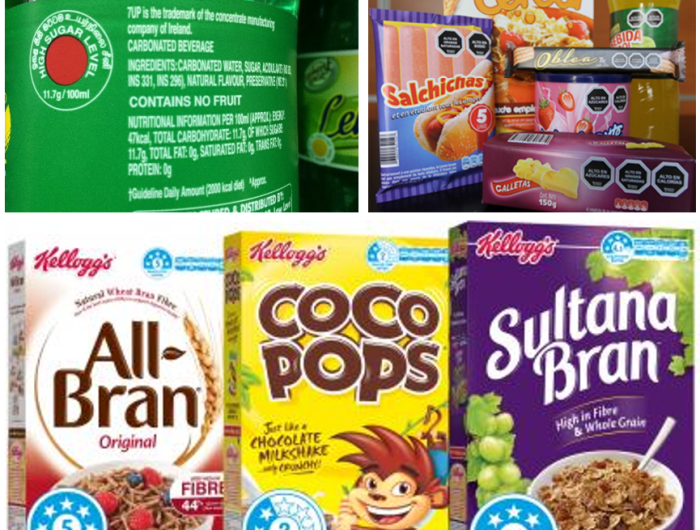Bringing food labeling into the 21st century

Pear in Mind: A blog in the public interest
Example of Sri Lanka's mandatory traffic light labels for beverages (top left), example of Chile's mandatory nutrient warning labels (top right), example of Australia and New Zealand's voluntary health star rating labels (above)
Nutrition science and technology are rapidly evolving, but related public health legislation is lagging behind. For example, overwhelming evidence points to the efficacy of front-of-package nutrition labeling in nudging consumers towards healthier choices, and almost a third of Americans now buy groceries online. Yet the U.S. is not among the growing number of countries to implement mandatory front-of-pack labeling, and we have no nutrition labeling requirements for food sold online.
This week, Congressman Frank Pallone (D-NJ) and Senator Richard Blumenthal (D-CT) introduced the Food Labeling Modernization Act (FLMA) which would fill the gaps in current food labeling requirements in order to promote public health and nutrition.
The centerpiece of the bill is the adoption of front-of-package nutrition labeling. Many other countries have adopted front-of-package labeling systems, such as star systems to rank the healthfulness of products, or traffic lights or nutrient warning labels to identify products that are high in calories, sodium, sugar, or saturated fat. These labels are associated with healthier food and beverage purchases, and have also led food companies to reformulate their products to avoid warnings or improve ratings. For example, a Chilean study found a 15% reduction in products that were high in sugar following implementation of mandatory front-of-package nutrient warning labels. Experimental studies show significant reductions of -0.7 grams of sugar and -34 milligrams of sodium per purchase among consumers exposed to “high in” labels versus no labels. It’s long overdue for the United States to reap the benefits of a mandatory front-of-package labeling system.
It’s also time for Congress to ensure that consumers can access information in the burgeoning online food marketplace. The last time Congress made major changes to the food label was with passage of the Nutrition Labeling and Education Act of 1990, and that law did not anticipate the advent of online grocery shopping. The FLMA would update labeling laws to require that the same Nutrition Facts, ingredient, and allergen information now on packages must be available for online grocery items.
The FLMA would also help counter misleading claims that make foods appear healthier than they truly are. For example, the Dietary Guidelines for Americans recommend making at least half of your daily grains whole grains, so many consumers seek out whole grain products. But claims like “multigrain” and “honey wheat” can be deceiving—these terms tell us nothing about the whole grain content of foods, and the amount of whole grain in these products can be trivial. Similarly, parents looking to ensure their children get enough fruit often come across “fruit drinks” that are marketed with images of fresh fruit and look exactly like 100% juice but actually contain primarily added sugar and water (with a smidgeon of fruit flavoring). The FLMA would require products marketed with images of fruits and veggies to declare the amount of real fruit or vegetables they contain, and products marketed with terms like multigrain and honey wheat to disclose what percent of the grains are whole versus refined. This transparency will make it easier for consumers to follow national dietary recommendations.
Speaking of transparency, the FLMA would add important ingredient information not currently available on food labels. For example, people who are pregnant, have certain health conditions, or take certain medications or supplements need to limit or avoid caffeine. But there’s currently no way of knowing how much caffeine is in many products! FLMA would require caffeine disclosure. FLMA would also require clearer disclosure of gluten-containing grains, an enormous step forward for the millions of people in the US with celiac disease, a digestive disorder triggered by gluten.
It’s time for food labels to join us in the 21st century, and for Congress to take advantage of science-based food labeling as an important tool for protecting consumers and promoting healthy diets.
Tell Congress to pass the Food Labeling Modernization Act here.
Tags
Topics

